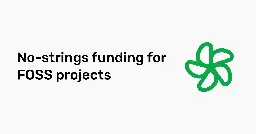
Programming
- Programming.dev instance: Sponsors needed
Hi all, I'm relatively new to this instance but reading through the instance docs I found: >Donations are currently made using snowe’s github sponsors page. If you get another place to donate that is not this it is fake and should be reported to us.
Going to the sponsor page we see the following goal: > @snowe2010's goal is to earn $200 per month > > pay for our 📫 SendGrid Account: $20 a month 💻 Vultr VPS for prod and beta sites: Prod is $115-130 a month, beta is $6-10 a month 👩🏼 Paying our admins and devops any amount ◀️ Upgrade tailscale membership: $6-? dollars a month (depends on number of users) Add in better server infrastructure including paid account for Pulsetic and Graphana. Add in better server backups, and be able to expand the team so that it's not so small.
Currently only 30% of the goal to break-even is being met. Please consider setting up a sponsorship, even if it just $1. Decentralized platforms are great but they still have real costs behind the scenes.
Note: I'm not affiliated with the admin team, just sharing something I noticed.
- Rider and Webstorm from JetBrains are now free for non-commercial useblog.jetbrains.com WebStorm and Rider Are Now Free for Non-Commercial Use | The JetBrains Blog
WebStorm and Rider, JetBrains IDEs, are now free for non-commercial use! Learn more in the blog post.

- Is there a way to hide dependabot commits in the history of a repo?
I'm trying to see how active a project is, but dependabot spam makes it annoying to find actual commits and to know if those commits are relevant.
There's no need for me to know chai was updated from
5.1.1to5.1.2, I want to see what were the most recent actual features implemented. - Working from multiple computers - thoughts on auto-push branch to git repository?
Hi programmers,
I work from two computers: a desktop and laptop. I often interrupt my work on one computer and continue on the other, where I don't have access to uncommitted progress on the first computer. Frustrating!
Potential solution: using git to auto save progress.
I'm posting this to get feedback. Maybe I'm missing something and this is over complicated?
Here is how it could work:
Creating and managing the separate branch
Alias git commands (such as git checkout), such that I am always on a branch called "[branch]-autosave" where [branch] is the branch I intend to be on, and the autosave branch always branches from it. If the branch doesn't exist, it is always created.
handling commits
Whenever I commit, the auto save branch would be squashed and merged with the underlying branch.
autosave functionality
I use neovim as my editor, but this could work for other editors.
I will write an editor hook that will always pull the latest from the autosave branch before opening a file.
Another hook will always commit and push to origin upon the file being saved from the editor.
This way, when I get on any of my devices, it will sync the changes pushed from the other device automatically.
Please share your thoughts.
- Postiz (v1.6.6) - open-source social media scheduling tool

Postiz is an open-source social media scheduling tool that is similar to traditional ones: Buffer, Hootsuite, SproutSocial, etc.
https://github.com/gitroomhq/postiz-app/
Postiz supports:
Key features:
-
Schedule for nine social media platforms (Threads, Pinterest, Facebook, TikTok, Reddit, LinkedIn, Dribbble, YouTube, Instagram.)
-
Fundamental analytics for almost all social media platforms.
-
AI Features: Copilots, AI Auto-complete, Canva-like editor.
-
Team support: Invite your team members to manage social media.
-
Generic Email Provider & Easier installation experience (drop the default Resend and add a nodemailer option!)
-
There are lots of improvements for the docker / docker-compose. It's much easier to deploy everything!
-
Added Bluesky, Mastodon, Slack and Discord channels!
-
Add multiple options for upload files (locally / R2) - working on S3.
-
Improve the refresh token mechanism (even for more complicated ones like Facebook and Instagram)
-
Invite to a team has significant fixes but will be refactored.
What's next:
-
Postiz is a company run by one person and contributors. Accessing all the support tickets (especially installation) is difficult, so I will focus all my efforts on making installation easier.
-
Productivity - many things feel bad when posting, like selecting multiple images and pasting images directly into the editor.
-
Basic SSO for the self-hosters, and more advanced ones like Azure AD and Okta for the enterprise.
-
Public API (unfortunately, I decided to make this feature paid; I need to make money somehow :/ )
-
Tagging brands on Instagram
-
Segmenting accounts into customers
-
Tagging people on multiple platforms
-
Tagging posts for easier searches
-
Auto-plug features, like automatic repost / retweet.
-
- NimConf 2024 - October 26th at 11am UTCconf.nim-lang.org NimConf 2024
NimConf 2024 will take place on October 26th at 10am UTC. Streamed live and for free from YouTube.
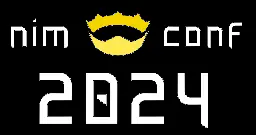
- What happens when you make a move in lichess.org?www.davidreis.me What happens when you make a move in lichess.org?
Dive deep into the open-source architecture of Lichess.org to understand the technical processes behind making a move in a game.

- Self-documenting Codelackofimagination.org Self-documenting Code
Think back to the last time you looked at an unfamiliar block of code. Did you immediately understand what it was doing? If not, you’re not alone – many software developers, including myself, find it challenging to grasp unfamiliar code quickly…

- Rant: "Knuth, The art of computer programming" is overhyped
The title. I have read many technical books (mostly compilation, programming languages & automata) , blogs and whatnot, and recently borrowed the above mentioned book Volume4 (combinatorial problems) from a local library. Just to give a try since Knuth is such a respected person in computer science.
It is by far the most frustrating and maddening book i ever laid my eyes upon. The author doesn't make the slightest effort to explain why something is useful, changes examples before explaining why previous example is interesting or how it shows why X is useful. On page 8, he says that "Graeco Latin squares allowed to François Cretté de Palluel to do with 16 sheeps, what otherwise would require 64 sheeps". How & why ?? No fucking clue. I know i am not the smartest person on earth, but i would love a little hand holding here, you know to explain a concept he introduced 2 pages previously, and gave 3 random anecdotes about.
The writing style is a complete opposite of what I (and I believe, what are most people ) am expecting. If you know something, it won't be useful, and you don't know something : don't count on the book for explanation. I had the physical urge to slap Knuth. It's absolutely maddening.
He then goes on his little hobby to gather 5 letter-English-words, and gives some fancy looking graphs with fancy names (3 cubes, Petterson graph, Chvatal graph). For all what i know, it could be graphs called 42 and graph Blabla. Again no clue how it's useful, nor why it's interesting. He introduces some definitions and theorems.
I am on page 26 (thr book is thicker than a bible) i think i am done. This book will not make you a better programmer, i have no idea who and for what reason could possibly find it useful?
If you think i am overreacting and should continue reading, please tell me so, but i don't expect it to get better
- The empire of C++ strikes back with Safe C++ proposalwww.theregister.com The empire of C++ strikes back with Safe C++ proposal
You pipsqueaks want memory safety? We'll show you memory safety! We'll borrow that borrow checker
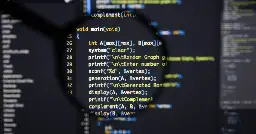
- Designing A Fast Concurrent Hash Tableibraheem.ca Designing A Fast Concurrent Hash Table
I recently released papaya, a fast and feature-complete concurrent hash table for Rust. In this post I want to dive into the design and research that went into creating it, as well as why you might consider using it over existing solutions.

- Looking for a python friendly cloud-based notes app.
I'm working on a python program, and i need to sync the results to an ipad as a todo list (with checkboxes)
I had been using google keep, and manually copying /pasting the data over from my cli based app. I will be out of the country for 2 weeks, so im updating my software to no longer being cli, and ideally syncing the final list to google keep or something similar, since someone else will be running the software. You know how normies get when they see a terminal window..
tried this googlekeepapi thing i found online, but the authentication was very complicated and i couldn't get it to work. There is no specific reason we need to use google keep, was just the first thing that came to mind when we set this system up, and it works well and is cloud based.
Do yall know of any service where i can programmatically generate checkbox lists, and sync them over the web?
I should note i do not have a server available to self host. could potentially spin something up locally with a raspberry pi, but would prefer not to have another potential point of failure.
- How do we evaluate people for their technical leadership?chelseatroy.com How do we evaluate people for their technical leadership?
By the way, you can listen to me read this post aloud on my Patreon (for free), and you can access many other audio recordings starting at $1/month! In February some years ago, my then-manager surp…

> Our workflows and productivity metrics regularly ask knowledge workers for things that do not make good knowledge work.
> Bloggers on reddit lament how much “meta-work” and “not-work” exists in tech. They kvetch about the conversations and the waiting. They consider the principal engineer’s calendar, packed with meetings, quod erat demonstratum that those roles are “easy” and “airware.” They insist that, if they could manage to not get caught, they could keep several such positions simultaneously and never under-deliver on any of them. None of these jobs, they claim, ask them for all that much code.
- GitHub - sv1sjp/lemmy-rss-pybot: Lemmy RSS PyBot is a powerful Python bot that reads RSS feeds and posts new articles to your favorite Lemmy communities.github.com GitHub - sv1sjp/lemmy-rss-pybot: Lemmy RSS PyBot is a powerful Python bot that reads RSS feeds and posts new articles to your favorite Lemmy communities.
Lemmy RSS PyBot is a powerful Python bot that reads RSS feeds and posts new articles to your favorite Lemmy communities. - sv1sjp/lemmy-rss-pybot
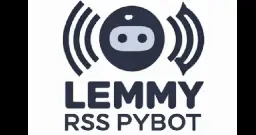
Hello everyone! 🎉
I’ve created an RSS Feed Bot that automates sharing news in Lemmy and Fediverse channels, helping to keep Fediverse users better informed. The bot is written in Python3 and can easily run via Docker Compose.
Hope you find it useful! 🚀
#Lemmy #Fediverse #RSS #Python #Docker #Automation #OpenSource
- You're overcomplicating productionparavoce.bearblog.dev You're overcomplicating production
You're going to have outages in production. They're inevitable. The question is how to best minimize outages, both their frequency and duration. Common wi...

Sharing some lessons I learned from 10 years/millions of users in production. I’ll be in the comments if anyone has any questions!
- How do you deploy in 10 seconds?paravoce.bearblog.dev How do you deploy in 10 seconds?
This post describes my lessons learned after 10 years running production environments in sizes ranging from "just getting started" to a "Series F" company wi...

Hi friends, as promised, I'm back with my second post. I'll be hanging around in the comments for any questions!
In this post, I take a look at a typical deployment process, how long each part of it takes, and then I present a simple alternative that I use which is much faster and perfect for hobbit software.
- Async Javascript State Managementpositive-intentions.com Dim: Async State Management | Welcome to positive-intentions
I'm working on creating something I can call "functional web components".

- P3477R0: There are exactly 8 bits in a byte
A new proposal for C/C++ to force bytes to be 8 bits wide
- Book Review: Continuous Architecture in Practicecontinuousarchitecture.com Continuous Architecture in Practice
Software architecture in the age of Agility and DevOps
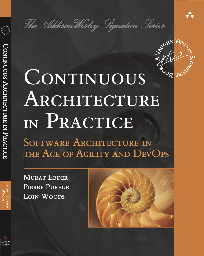
I just finished reading this book and decided to share my experience with it.
About the Book
Continuous Architecture in Practice is a sequel to Continuous Architecture both written by Murat Erder, Pierre Pureur, and Eion Woods. The authors attempt to address feedback from their 1st book by navigating the reader through the Trade Financs eXchange (TFX) case study.
The book starts with a brief introduction to the core concepts of Continuous Architecture, including its 6 principles, as well as its essential activities:
- Focus on quality attributes
- Drive architectural decisions
- Know your technical debt
- Implement feedback loops
From then on the book switches focus to common architectural concerns:
- Data
- Security
- Scalability
- Performance
- Resilience
- Emerging Technologies
Each concern is tackled in a separate chapter that features an introductory quote, a definition along with some historical context, a list of issues an someone should keep in mind when architecting for that concern, a list of tactics, and a further reading section.
My Opinion
Overall, I liked reading the book, it gave me a lot of inspiration and a desire to learn more about particular topics. The book assumes a certain level of familiarity with software engineering which helps it focus on general concerns and avoid implemention specific details.
I particularly liked the Emerging Technlogies chapter as it offers a healthy view on AI, ML, and shared ledgers. It helps remove the fairy dust that's blinding our industry, and instead focuses on meaningful changes that actually provide value to a product.
Also, as someone with experience in software security I appreciated the focus on shifting left security concerns.
Who Should Read This
In my opinion, every software engineer can benefit from reading this at some point in their career. However, I wouldn't recommend it to a junior, if you are not already familiar with the topics covered in the book it could be intemediating.
PS I am not affiliated with the book or its authors in any way. I am just a person that read a book they liked wanted to share my experience.
- Is The Fold Method Bodies by Default a Missing IDE Feature ?matklad.github.io A Missing IDE Feature
Slightly unusual genre --- with this article, I want to try to enact a change in the world. I believe that there is a missing IDE feature which is:
- GCC Preparing To Set C23 "GNU23" As Default C Language Version
cross-posted from: https://lemmy.ml/post/21458338
> The GNU Compiler Collection (GCC) support for the C23 programming language standard is now considered "essentially feature-complete" with GCC 15. As such they are preparing to enable the C23 language version (using the GNU23 dialect) by default for the C language version of GCC when not otherwise specified. > > Preparations are now underway to set the default C language version of GCC to GNU23 as the GNU dialect of C23. Or in other words, implying -std=gnu23 when no other C standard is specified. >
- Python is still the most popular coding language, but challengers are gaining groundwww.techspot.com Python is still the most popular coding language, but challengers are gaining ground
The latest update to the TIOBE Index reveals notable shifts in the world of software development. While traditional programming languages remain popular, many developers are seeking out...

> The latest update to the TIOBE Index reveals notable shifts in the world of software development. While traditional programming languages remain popular, many developers are seeking out technologies that can make sense of the vast amounts of modern digital data. Legacy languages like C, COBOL, Fortran, and Assembly still have their place, but they no longer take center stage.
- Getting started with Turtle or Semantic Web?
I only recently learned about Turtle but it seems like a fun way to represent data. I'm curious to learn more & mess around with it or similar formats for representing the meaning of English text. Anyone have any suggestions for projects, libraries, etc to look into?
- Creating QR Codes with Javascript to use as a Data Channelpositive-intentions.com QR Codes as a Data Channel | Welcome to positive-intentions
Explore the new "File Sharing by QR Code" feature in our decentralized chat app. Learn how we use JavaScript-based QR technology for offline data exchange and the innovative potential of this experimental approach.

https://positive-intentions.com/blog/qr-codes-as-a%20data-channel
QR Codes as a Data Channel
the demo in the blog article is a bit cluncky. here is a better link for it: https://chat.positive-intentions.com/#/qr
- Stack Overflow Survey: 80% of developers are unhappyshiftmag.dev Stack Overflow Survey: 80% of developers are unhappy
This year, as expected, the main topics in the Stack Overflow survey were use of AI and dissatisfaction in the workplace.

- Build Systems, Not Heroesvitonsky.net Build Systems, Not Heroes
Enterprise programming is the management of system complexity. The main goals of most enterprise projects are to minimize bugs, ensure scalability, and release as soon as possible. These goals are unreachable in projects where people rely on individual skills rather than on a system-based approach.

- Concurrency is not parallelismgo.dev Concurrency is not parallelism - The Go Programming Language
Watch Rob Pike's talk, _Concurrency is not parallelism._

- Announcing Deno 2 - Full npm compatibility, Stabilized Standard Librarydeno.com Announcing Deno 2
Our next major version of Deno combines the simplicity, security, and performance of Deno 1 with full Node and npm backwards compatibility, and much more.

> Today, we’re thrilled to announce Deno 2, which includes: > >* Backwards compatibility with Node.js and npm, allowing you to run existing Node applications seamlessly >* Native support for package.json and node_modules >* Package management with new deno install, deno add, and deno remove commands >* A stabilized standard library >* Support for private npm registries >* Workspaces and monorepo support >* Long Term Support (LTS) releases >* JSR: a modern registry for sharing JavaScript libraries across runtimes
>We are also continually improving many existing Deno features: > >* deno fmt can now format HTML, CSS, and YAML >* deno lint now has Node specific rules and quick fixes >* deno test now supports running tests written using node:test >* deno task can now run package.json scripts >* deno doc’s HTML output has improved design and better search >* deno compile now supports code signing and icons on Windows >* deno serve can run HTTP servers across multiple cores, in parallel >* deno init can scaffold now scaffold libraries or servers >* deno jupyter now supports outputting images, graphs, and HTML >* deno bench supports critical sections for more precise measurements >* deno coverage can now output reports in HTML
Deno is a single binary for the TypeScript and JavaScript ecosystems. Deno is secure by default (installing npm libs do not automatically have full system perms/access).
The new standard library stabilizes a vetted collection of safe binaries instead of having to search for and install random libraries for basic or common use cases with [or without] own security assessments.
Deno compile compiles the TS/JS project into a single binary.
The backwards compatibility to npm and npm/js frameworks enables deno usage in existing projects and with existing libs with the benefits of deno and a path to incremental migration.
The announcement video is worth watching. The intro is great.
- Steam 'Ada Lovelace Day' Sale - Coding, Automation, Engineering gamesstore.steampowered.com Ada Lovelace Day
Every second Tuesday of October Ada Lovelace Day is celebrated - to commemorate the famous English mathematician of the XIX century, and the first programmer in history. To mark this occasion, we rounded up a party of games that are not only fun to play, but can teach you to think like a true engine...
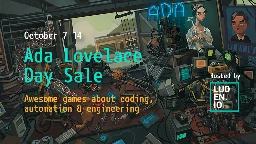
> Every second Tuesday of October Ada Lovelace Day is celebrated - to commemorate the famous English mathematician of the XIX century, and the first programmer in history. > >To mark this occasion, we rounded up a party of games that are not only fun to play, but can teach you to think like a true engineer and feel like a tech wizard! > >Welcome to Ada Lovelace Day Sale. Hello, world!
ends 14th (tomorrow)
- WordPress.org’s latest move involves taking control of a WP Engine pluginwww.theverge.com WordPress.org’s latest move involves taking control of a WP Engine plugin
WordPress.org flexes its control of open-source plugins.

cross-posted from: https://lemmy.today/post/17580707
- How proficient do you rate yourself in your most coded language?
Hi,
My question certainly stems from the imposter syndrome that I am living right now for no good reason, but when looking to resolve some issues for embedded C problems, I come across a lot of post from people that have a deep understanding of the language and how a mcu works at machine code level.
When I read these posts, I do understand what the author is saying, but it really makes me feel like I should know more about what's happening under the hood.
So my question is this : how do you rate yourself in your most used language? Do you understand the subtilities and the nuance of your language?
I know this doesn't necessarily makes me a bad firmware dev, but damn does it makes me feel like it when I read these posts.
I get that this is a subjective question without any good responses, but I'd be interested in hearing about different experiences in the hope of reducing my imposter syndrome.
Thanks
- The ongoing feud between Wordpress and WP Engine is threatening open-source principles and good namewww.techspot.com The ongoing feud between Wordpress and WP Engine is threatening open-source principles and good name
WordPress creator Matt Mullenweg is trying to force WP Engine to surrender part of its revenue to his company, Automattic, and the feud's repercussions are rippling throughout...

- The WordPress ecosystem has lost its mind… - YouTube
YouTube Video
Click to view this content.
- Any recommendations/tips for mentorship services?
I've had a very tough time finding my first position as a junior dev and have been looking into getting a paid mentor to help me out. Someone who can give me a specific, clear idea of what skills I might need to have, refine, etc, as well as some looser guidance and direction after losing my confidence.
Do any of you have experience with services like this? Somewhere like Mentor Cruise or something similar?
Edit: to be clear, I'm looking for my first role as a web developer, ideally frontend with React (which is what I feel most confident in). I've been at this for over a year and a half - I do have a portfolio, Github, etc with projects in JS and some basic Python. I'm aware of how to look for a job, but actually getting anyone to look at me has been the hard part, as I've only had two interviews that went nowhere. The handful of people who've seen my portfolio seemed fine with it and the impression I have is that it is enough to demonstrate my skill level, but I'm still getting very little back.


